End of the day in the House of Lordspublished at 23:04 BST 12 October 2016
 House of Lords
House of Lords
Parliament
And that's it from the House of Lords today.
Peers return at 11am tomorrow for questions.
Party leaders questioned over women MPs post-2020
Commons day starts with Scotland questions
PMQs is at noon
Opposition day debate on Parliamentary scrutiny of Brexit
Lords kicks off at 3pm with questions to government ministers
Main business is report stage of Bus Services Bill and a debate on the BBC Royal Charter
Aiden James, Alex Partridge and Esther Webber
 House of Lords
House of Lords
Parliament
And that's it from the House of Lords today.
Peers return at 11am tomorrow for questions.
BBC Royal Charter debate
 House of Lords
House of Lords
Parliament
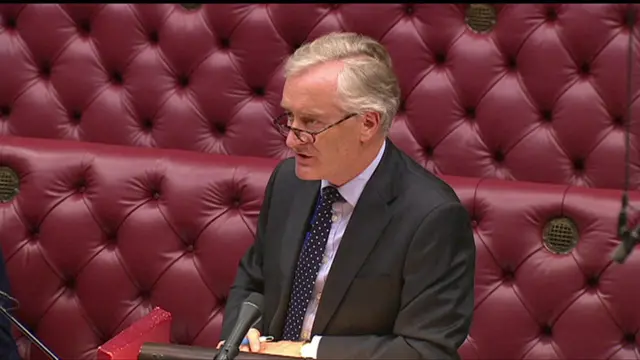
Lord Ashton of Hyde is winding up the debate for the government. He starts by addressing the most prominent concern of the debate, the idea of "distinctiveness".
He says that the government defined "distinctive" in the case of the BBC as offering a "range of genre", the "quality of programmes" and "risk taking and innovation". He says that individual programmes will not be assessed for their distinctiveness.
On the charter's obligation for the BBC to provide salary transparency over it's biggest on-screen earners, he says that the government believes that licence fee payers "deserve" transparency, as they're the people who pay BBC employees' wages.
He also announces that salary transparency will not apply to BBC Studios, a new division of the corporation which will make some of the BBC's biggest hits including Strictly Come Dancing and EastEnders.
BBC Royal Charter debate
 House of Lords
House of Lords
Parliament
Lord Foster of Bath winds up the debate for the Liberal Democrats. He welcomes the charter but joins those who have concerns about the requirement in the Royal Charter for the BBC to be "distinctive", and questions how this will be interpreted by the new regulator Ofcom. He calls the BBC the "best and most trusted broadcaster in the world" and says he hopes the new charter will allow it to remain so.
Labour frontbencher Lord Stevenson of Balmacara also has warm words for the BBC. But says he's worried that some changes in the charter may foster a "defensiveness" within the BBC and have the opposite effect to that intended.
BBC Royal Charter debate
 House of Lords
House of Lords
Parliament
Labour's Lord Maxton raises the suggestion of the Culture, Media and Sport Committee that there be an hour long "Scottish Six" news programme to replace the London-produced BBC Six O'Clock News and the local news programme "Reporting Scotland". He says that "one only has to listen to Good Morning Scotland on the radio to know that's not something any Scot would want".
He also questions the length of the charter, which this time around will last for 11 years. It is, he believes, too long for the BBC to be able to keep up with technological change.
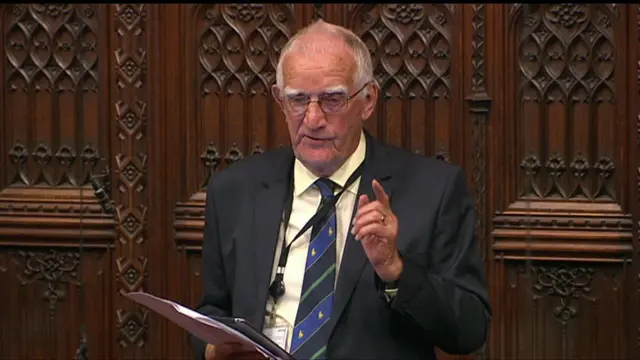
BBC Royal Charter debate
 House of Lords
House of Lords
Parliament
The most eye-catching proposed change to the BBC's Royal Charter is the clause that forces the corporation to name all those earning more than £150,000 a year.
Currently the BBC only discloses the salaries of executives who earn more than £150,000 a year, but the new charter will force disclosure of highly paid on-air talent too.
BBC Trust chair Rona Fairhead and Director General Tony Hall both criticised the idea. Tony Hall said it would make it harder for the BBC to retain talent in a competitive marketplace.
But Strictly Come Dancing co-host Claudia Winkleman has said she thinks it's fair because BBC stars are "working for the public".
BBC Royal Charter debate
 House of Lords
House of Lords
Parliament
Among the peers having their say tonight are many with links to the BBC and the tone is broadly sympathetic towards the corporation.
Labour's Lord Bragg, aka Melvin Bragg of Radio 4's In Our Time, talks about the variety available on the BBC and takes the opportunity to simply list the highlights due to be broadcast on Radio 4 tomorrow including the Shipping Forecast and, of course, Today in Parliament.
Baroness Kidron, a film director who's worked for the BBC, says she worries that the obligation in the new charter for the BBC to be "distinctive" may be a "Trojan horse" to allow the BBC to be undermined. She questions what "distinctive" means in the context. "Is Bake Off distinctive, or just popular?", she asks.
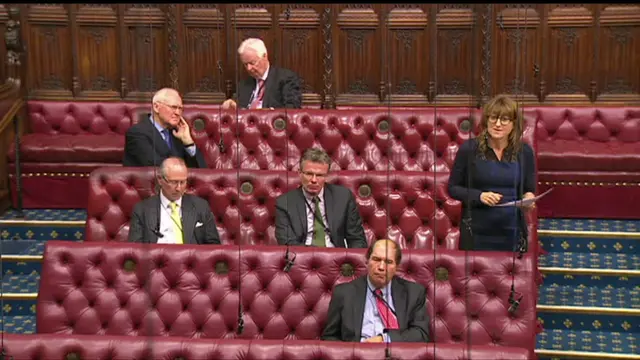
Theresa May rejects a claim by Jeremy Corbyn that she is overseeing a "shambolic Tory Brexit", instead promising an "ambitious" deal for the UK.
Read MoreBBC Royal Charter debate
 House of Lords
House of Lords
Parliament
Lib Dem Baroness Bonham-Carter of Yarnbury broadly welcomes the new charter but says that the government must agree that there "must be no more raids" on the BBC's income, like the shifting of the obligation for paying for free TV licences for the over 75s to the corporation.
Former BBC Director General and Crossbench peer Lord Birt also condemns government "raids" on the corporation, including the coalition government's decision to force the BBC to fund the World Service, which had previously been paid for out of the Foreign and Commonwealth Office's budget. But he says he "wholeheartedly" backs the government's focus on demanding "distinctiveness" from the BBC's output.
 House of Commons
House of Commons
Parliament
That concludes a very busy day in the Commons.
MPs meet again from 9.30am on Thursday and the day begins with questions to environment ministers.
Leader of the House David Lidington will announce forthcoming Commons business before MPs take part in two backbench debates; on baby loss and on an inquiry into hormone pregnancy tests.
Finally, Labour MP Tulip Siddiq will lead an adjournment debate on the costs of independent living for disabled people.
 House of Lords
House of Lords
Parliament
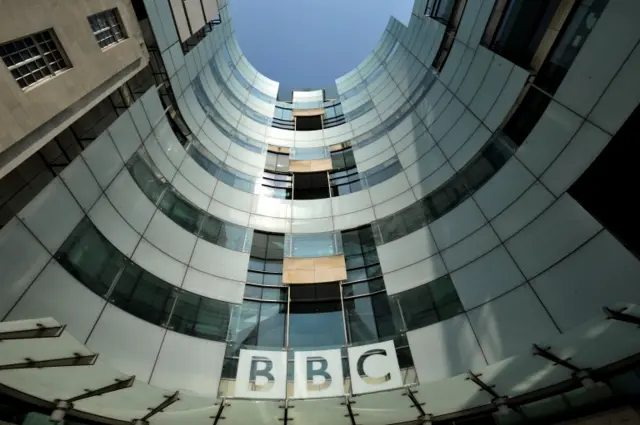 Image source, PA
Image source, PAThe BBC's HQ at New Broadcasting House
Lord Ashton of Hyde is opening the debate into the BBC's new Royal Charter for the government. He calls the broadcaster an "extraordinary national treasure".
He begins laying out some of the features of the new charter, including the new unitary board that will run the corporation, the move from self-regulation to regulation by the broadcasting watchdog Ofcom and the listing of those earning more than £150,000 a year.
Lord Ashton says the charter will "secure the future of the BBC, strengthen it and give it an unprecedented degree of independence," adding: "The world's finest broadcaster deserves nothing less."
The Royal Charter is the constitutional basis for the BBC's existence. The current charter runs out at the end of December.
BBC political editor tweets...
Allow X content?
This article contains content provided by X. We ask for your permission before anything is loaded, as they may be using cookies and other technologies. You may want to read X’s cookie policy, external and privacy policy, external before accepting. To view this content choose ‘accept and continue’.
Allow X content?
This article contains content provided by X. We ask for your permission before anything is loaded, as they may be using cookies and other technologies. You may want to read X’s cookie policy, external and privacy policy, external before accepting. To view this content choose ‘accept and continue’.
Bus Services Bill
 House of Lords
House of Lords
Parliament
Peers vote for the Labour amendment to expand bus franchising by 167 to 150.
It's the fourth government defeat of the day in the Lords.
 House of Commons
House of Commons
Parliament
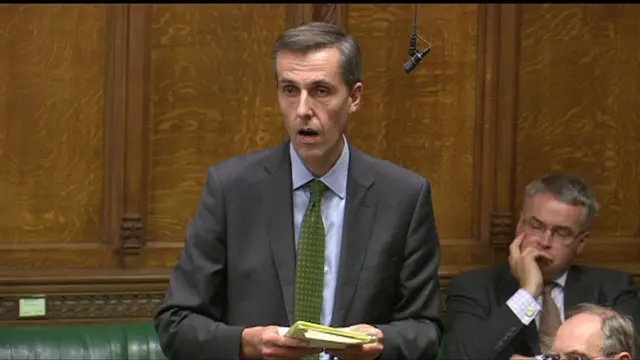
Following the presentation of more petitions on the implementation of the 1995 and 2011 Pension Acts, after Tuesday night's epic line-up of MPs doing the same, we proceed to the adjournment debate.
Conservative MP Andrew Selous is opening a short debate on gypsies and traveller policy.
Parliamentary scrutiny of the UK leaving the EU
 House of Commons
House of Commons
Parliament
After an often fractious debate, the House comes to a kind of agreement, accepting the government's amendment without a vote and then agreeing to Labour's motion as amended:
Quote MessageThat this House recognises that leaving the EU is the defining issue facing the UK; believes that there should be a full and transparent debate on the government's plan for leaving the EU; and calls on the prime minister to ensure that this House is able properly to scrutinise that plan for leaving the EU before Article 50 is invoked... and believes that the process should be undertaken in such a way that respects the decision of the people of the UK when they voted to leave the EU on 23 June and does not undermine the negotiating position of the government as negotiations are entered into which will take place after Article 50 has been triggered."
Bus Services Bill
 House of Lords
House of Lords
Parliament
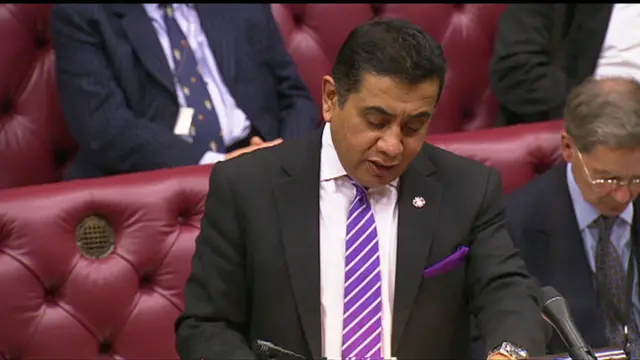
Transport Minister Lord Ahmad of Wimbledon rejects the amendment to expand franchising powers for buses beyond areas with elected mayors.
He says his problem with the amendment isn't "to do with protecting bus companies", but is about the "uncertainty" that allowing all local areas to access franchising powers would cause.
Franchising powers would see bus companies competing for contracts from local authorities to run specific routes, as in London.
Lord Ahmad's objections aren't enough to convince Labour though, whose front bench decide to put the amendment to a vote.
Parliamentary scrutiny of the UK leaving the EU
 House of Commons
House of Commons
Parliament
Minister David Jones claims that, while a deal on trade is important, there is "no mandate for a deal" which includes existing freedom of movement rules.
He does not believe that there is a "binary trade off" between trade and immigration.
He urges members to move on from the referendum result.
Parliamentary scrutiny of the UK leaving the EU
 House of Commons
House of Commons
Parliament
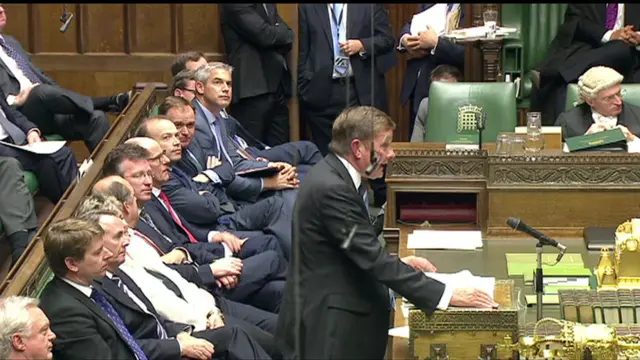
Replying for the government, David Jones says today's debate "is part of the process by which Parliament will hold government to account".
The minister for exiting the European Union says the planned Great Repeal Bill will restore Parliament's right to determine which of the EU laws to be brought into UK law are in the national interests.
But, once negotiations start, the government cannot "damage its position in those negotiations by spelling out in fine detail" its position, he argues.
He insists the government has set out its broad aims: "regaining control of our borders and having the most open access possible to the EU market."
The pound has recovered some of its recent losses, with analysts attributing the gains to the promise of a Commons debate on the Brexit process.
The pound closed 0.6% higher on Wednesday at $1.22, but down from its best levels for the day.
Against the euro, the pound rose nearly 1% to close at €1.11.
Sterling has been sliding since Prime Minister Theresa May announced on 2 October that the formal Brexit process would start by the end of March 2017.
Traders have been selling the pound, fearing the impact of leaving the single market.
Parliamentary scrutiny of the UK leaving the EU
 House of Commons
House of Commons
Parliament
Addressing supporters of leaving the EU who have said that "the sky didn't fall in" following the referendum result, Labour's Barry Gardiner says the Bank of England was pumping money "into the system".
He declares that "the pound has fallen to a 168 year low".
Parliamentary scrutiny of the UK leaving the EU
 House of Commons
House of Commons
Parliament
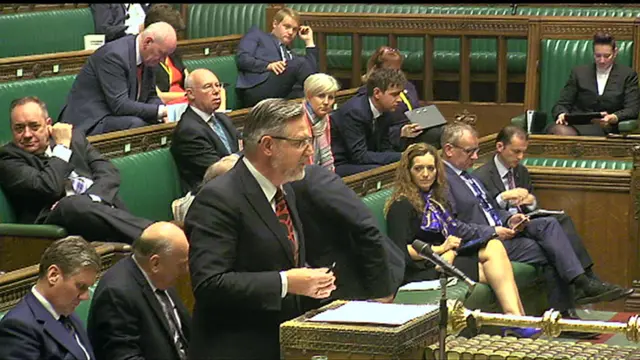
Shadow international trade secretary Barry Gardiner says the majority vote to leave the EU "represents a mandate and it must be respected".
But he adds that it doesn't mean the rights of "the 16m people who voted to remain should be trampled on".
MPs aren't calling for "a running commentary" on negotiations, he insists, but for the government to be "clear in its purpose and its objectives".
Quote MessageOur point is simply this: that it is not a discussion that the government can keep to itself. Parliament must be part of this discussion."